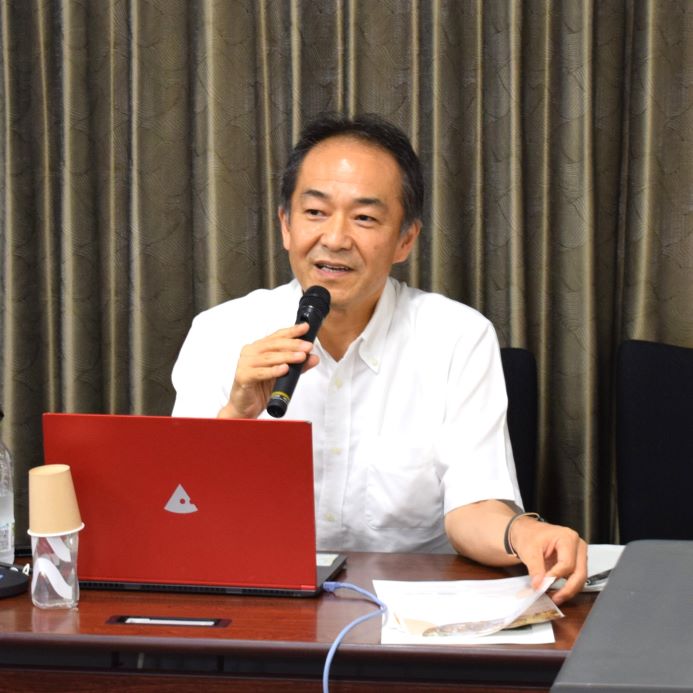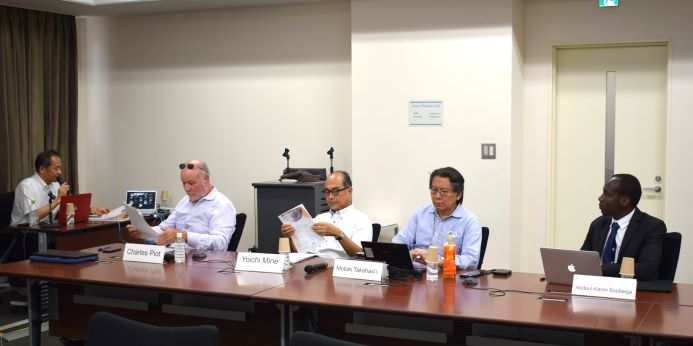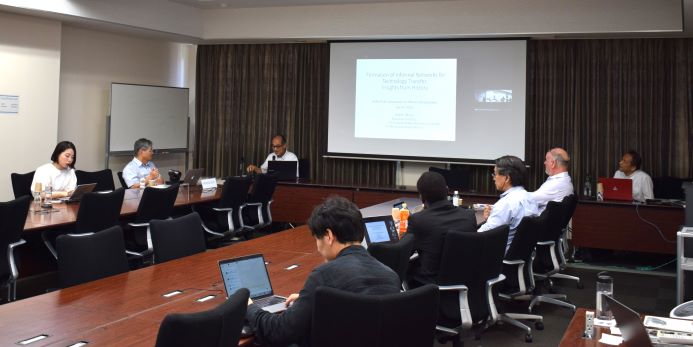The Research Institute for Economics and Business Administration (RIEB) of Kobe University, in collaboration with Duke University and the Research Platform on Manufacturing in Asia and Africa of the Japan Society for International Development, hosted the "Kobe-Duke Symposium on African Economic Development - Informality and Dynamism of African Economies" on July 20, 2023.
It is estimated that informal businesses generate about 80% of employment in Sub-Saharan Africa. Governments and international development agencies consider them minuscule, unproductive, and in many ways inferior, and their formalization is an important policy issue. However, there is no clear definition of informal and no easy dichotomy between informal and formal. This symposium does not take the conventional view of informal operators based on negative assumptions. From an empirical standpoint based on data and actual observed cases, from the viewpoint that informal enterprises are dynamic and creative entities that can be the bearers of inclusive economic development in African economies, this symposium promotes the discussion among researchers from economics and cultural anthropology.

In Session I, Professor Charles Piot of Duke University's Department of Cultural Anthropology called for a lively discussion on the fundamental issue of defining the concept more precisely, starting from the traditional concept of informality. Professor Yoichi Mine, the executive director of JICA Ogata Sadako Research Institute for Peace and Development, emphasized that development policy and cooperation should be based on ideas that positively transform the flexibility, creativity, and networking power that comes from people's spontaneity. Discussant Professor Misa Hirano from Graduate School of Asian and African Area Studies of Kyoto University emphasized the importance of informal businesses being able to make a living without interference from others. Andrew Debalen, chief economist for Africa Region of the World Bank, pointed out that Africa is in a "missing middle" situation, with an overwhelming majority of microenterprises and a few large enterprises, and almost no medium-sized enterprises, He stated that analyzing microbusinesses from the perspective of productivity is more likely to lead to policies.
In Session II, Professor Nobuaki Hamaguchi of RIEB reported the result of constructing an informality index, adopting the multiple correspondence technique for the dataset derived from a customer survey conducted jointly by the Duke University Africa Initiative and ASA International, the world's largest microfinance institution. In addition, he presented the results of an analysis showing that personal characteristics such as low levels of education and the use of official languages such as Swahili rather than English in business are associated with high levels of business informality, and that high levels of informality are associated with small size of businesses but not necessarily with business growth. Professor Motoki Takahashi of Graduate School of Asian and African Area Studies of Kyoto University presented a detailed information with visual images on sofa manufacturers in Kenya, which he had observed over several years. He concluded that the number of businesses is increasing but the size of each business is not growing, indicating "horizontal growth.” Discussant Aika Matsumoto, a doctoral student at Kyoto University's Graduate School of Asian and African Area Studies, proposed that the psychological bias that respondents have in answering questionnaires in a way that makes them want to be thought well of can cause problems in quantification. She also presented her observation from a study in Kenya about the resiliency of micro enterprises from the Covid-19 shocks Diana Nyachieo, PhD student at the University of Cape Town, provided a comprehensive overview of the rapidly growing share of informal employment in the Kenyan labor market.

Session III featured a panel discussion moderated by Professor Hiroyuki Hino, Research Fellow of RIEB and Visiting Research Scholar at Duke University. Professor Sayaka Ogawa of Ritsumeikan University's Graduate School of Advanced and Integrated Studies, who has been conducting field research in Tanzania for many years, stated that the three elements of coping with uncertainty, the need for social recognition, and personal trust are the characteristics of informal businesses that are independent and self-employed while maintaining human networks. Dr. Adeyemi Dipeolu, former special advisor to the President on Economic Matters in Nigeria, agreed that informal businesses can play a constructive role in the African economy, but that they should also be more active than ever in the public framework of tax payment, legal compliance, and human resource development for their employees. He also contested that governments should strengthen their bonds with informal businesses. Professor Murray Leibbrandt, Director of the Southern Africa Labour and Development Research Unit at the University of Cape Town, stated that in South Africa, informal businesses constitute a major component of the bottom of the pyramid, but their characteristics are not yet fully understood and the government has not yet developed effective policies. He stressed the need for further research. Mr. Abdul Karim Soubeiga, a native of Burkina Faso and a student in the Master's Program of the Graduate School of International Cooperation Studies, Kobe University, introduced that informal businesses are widely found not only in urban service and manufacturing industries, but also in rural areas in the form of pastoralism. He stated that it is difficult for the government to implement policies to encourage formalization because they exist in a dispersed manner.

In closing, Professor Hino summarized the issues discussed at the symposium and pointed out the following issues for future research: (1) the need to urgently establish a definition of informal that is analytically clear and operationally practicable; (2) differentiating informal businesses from microbusinesses in general (3) framing the design of a case study to allow for generalization of findings:; (4) the relationship between informal and the individual characteristics that contribute to informal and the results of informal business; and (5) the need to develop a common framework for the analysis and policy making. (3) to do so under a common framework so that case studies can be conducted in a mutually comparable manner; (4) establishing a model that captures the interworking of an informal economy and apply an appropriate quantitative method to look for desired evidence; and (5) focusing on productive growth. (For more information, see Hino, Kobe-Duke Symposium on Informality and Dynamism of African Economies: Summing-up)
The symposium was held in a hybrid format, with over 50 participants from Japan, Africa, and the U.S., including researchers, private companies, graduate students, and people affiliated with government agencies. The symposium ended successfully with a Q&A session after each research report, during which many questions and opinions were exchanged. For the program of the day, please refer to the website below.
https://www.rieb.kobe-u.ac.jp/seminar/file/2023/20230720.pdf
